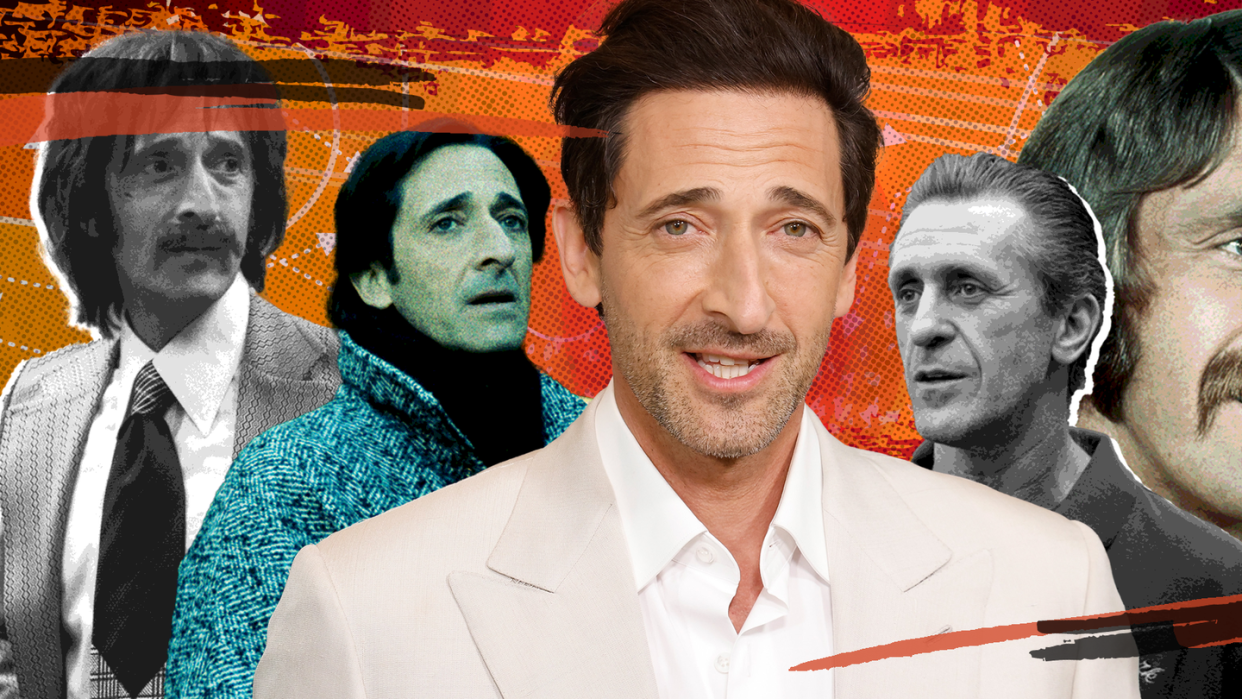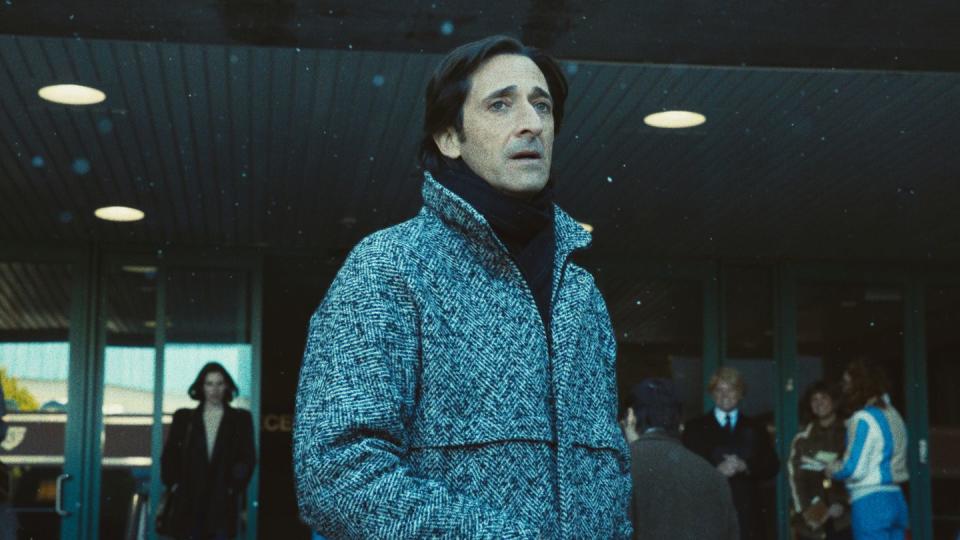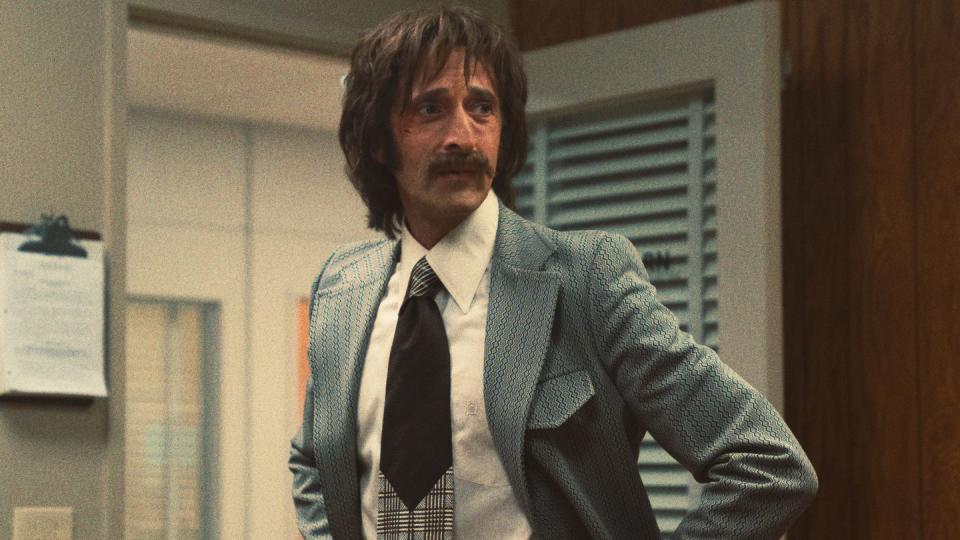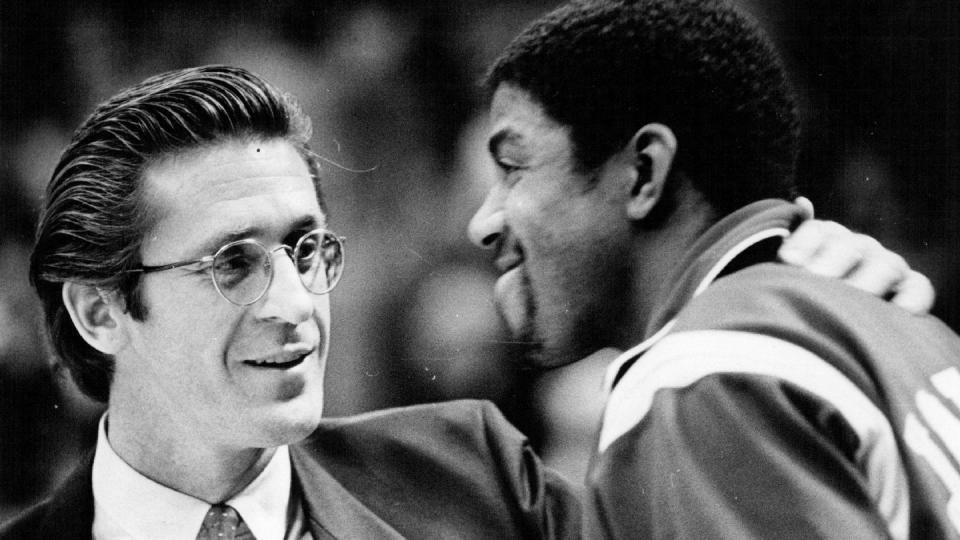How Adrien Brody Finally Transformed Into the Pat Riley We All Know

ADRIEN BRODY COULDN'T wait to become Pat Riley. Not the Pat Riley from Winning Time's first season, who was a mutton-chops-wearing deferential coaching assistant suppressing his competitive fire behind frustrated mustached scrunches in the '70s. He wanted to become the Pat Riley, the intimidating Showtime Lakers head coach of the '80s who motivated the team with moments of "temporary insanity"while sporting a signature slick back hair that dared gravity and humidity to interfere with its cool. He was playing Pat Riley in Season 1. He became Pat Riley in the latest episode of Winning Time's second season.
“I was chomping at the bit. It was a lot of pressure on me personally because, as I said, in taking the role, I feel a responsibility to honor Pat Riley,” Brody told Men’s Health weeks before the SAG-AFTRA strike. “He's someone I do hold in very high regard. I wanted to meet that challenge already. I didn't want it to be looming over me all this time.”
In episode five, Jerry Buss (John C. Reilly), Magic Johnson (Quincy Isaiah), Riley, and the entire Lakers team try to reassemble under the rubble of Johnson's explosive request to be traded due to his dissatisfaction with coach Paul Westhead (Jason Segel). Johnson curses out Buss for masking their employee-employer relationship in faux paternal love; Buss replaces Westhead with the coaching committee of Riley and Jerry West (Jason Clarke); the Lakers go on a losing streak that could tank their season. Riley has the title of head coach, but players still treat him as the same assistant coach they can pal around with instead of taking him seriously. "They like me, but they don't respect me," Riley tells his wife, Chris Riley (Gillian Jacobs), on Winning Time. "For the first time in my life, I look in the mirror, and I wish I was my father—someone they would fear."

In the intense locker room scene near the end of the episode, with Riley's attempt to rally the troops falling mute in the cacophony of disparate chatter, it happens. He snaps, sends a resounding punch into a blackboard, and kills the Pat Riley the team once knew. After ripping into everyone for their lack of commitment and vehemently rejecting ice for his bloodied hand, the Pat Riley the world knows now is born. And there's no looking back for Brody.
Men's Health: After 14 episodes, the fifth episode of Winning Time Season 2 is when we finally get rid of the mutton chops and deferential demeanor and finally get the fiery Pat Riley with the slicked-back hair. Do you all use the same hair products he did in the '80s to achieve the iconic look?
Adrien Brody: I think so. I think they did some research. We did a lot taming the mane. That was such a relief. On a superficial level, he looks way cooler. But, it's an embodiment of the confidence and strength he possessed that he had to pull out. I love that we finally got there. I felt this responsibility since day one of Season One of somehow honoring the man I recognize and you recognize. All of the attributes in so much of the research mostly pertained to what I could tap into for Season 2. I relate to both. I relate to that time in my own life when you're not finding your way. But, it was so hard because I identified so much with Riley as we know him...to put that mustache on. [Laughs.]
Pat Riley's relationship with his complicated father catalyzed this meaner Pat Riley, whom the Lakers could respect. How did you approach depicting that father-son relationship knowing millions of others, and likely Riley himself, were watching?
I'm merely an actor, and I have a responsibility to honor the writing, as well. Within that storytelling, it deals with personal things but respectfully so, and I'm respectful in my interpretation, and I think they're documented and researched. We all learn from our fathers from the positive traits and the negative ones. Sometimes, we're able to see the difference and learn from their mistakes. Sometimes, we repeat their mistakes and make our own. I think we know what Riley's achieved, and we know historically that his father didn't live up to his own potential in a lot of ways. Those are largely due to circumstances beyond his control and in his management position. But, for whatever reason, those frustrations and disappointments shaped the man he was, and that shaped Riley's upbringing.
That's something that is interesting in watching a man evolve into becoming someone so great and iconic, and a real leader, and to face those challenges. By the way, it's a universal thing. It's not just related to him. We all know fear is somehow equated to respect. You learn at a very young age that you can't be a pushover in life. You're not going to get that level of respect if you are, especially if your father is that way. If that's being instilled in the family structure, you understand that. Whether you know that you are able to navigate that positively somehow to not abuse that, but to know when to exert a level of control when necessary. I think that's valid.

What's the biggest difference between playing Riley in Season 1 and Season 2?
This transition to finally get to play Coach Riley was epic. I was chomping at the bit. It was a lot of pressure on me because, as I said, I felt a responsibility to honor Pat Riley in taking the role. He's someone I do hold in very high regard. I wanted to meet that challenge already. I didn't want it to be looming over me all this time. When you're doing episodic work, it can take a long time before you can land it. In film, you get there sooner. This was somewhat new territory for me to be patient, to find later. In retrospect, it's quite beautiful to have such a protracted arc for a character.
It really felt like part of your portrayal of Pat Riley was drawn from your own personality. To that point, were you acting when you yelled "Fuck Boston" at the end of episode 5, or was your internal New Yorker coming out?
[Laughs.] It's a bit of both, I guess. There's always a little internal New Yorker that's coming out that I'm trying to hide away on most days in most encounters (laughs). But, yes, I'm, I'm sure some of that stuff was my own, but it is also scripted.
There's definitely a little more bite to it than normal. Do you know if Pat Riley has seen your portrayal of him?
That's a good question. We have a lot of people in common that know him, but I don't know him. I admire him, but I don't know. I'm sure he's seen a glimpse, but I hope he sees Season 2 because I've been ready to represent him more is really what it comes down to. It's wonderful storytelling throughout, and the writing has been quite brilliant even throughout Season One. But this was important for me to honor him.

The Season 2 premiere starting with the 1984 NBA Finals foreshadows that that championship series would be where this season ends. If there is a Season 3 of Winning Time, where would you like it to go in terms of Riley's story?
It's too early to speculate, but if we were fortunate to be able to do that, this [Celtics/Lakers] rivalry has been ongoing for his whole career. I think [The 1985 NBA Finals] would be amazing and the next phase of that. But there are so many chapters of his life, and it'd be nice to see him really running things. We get to touch on it [in Season 2], but he's not fully there. He's much more fully formed, but he's not fully there, and neither is Magic. I think watching the two of them really come into their own fully...and there's all sorts of personal stuff that is fascinating for the viewer. But to see them really take charge and become those iconic people in sports history would be pretty fun to portray.
This interview has been edited and shortened.
You Might Also Like